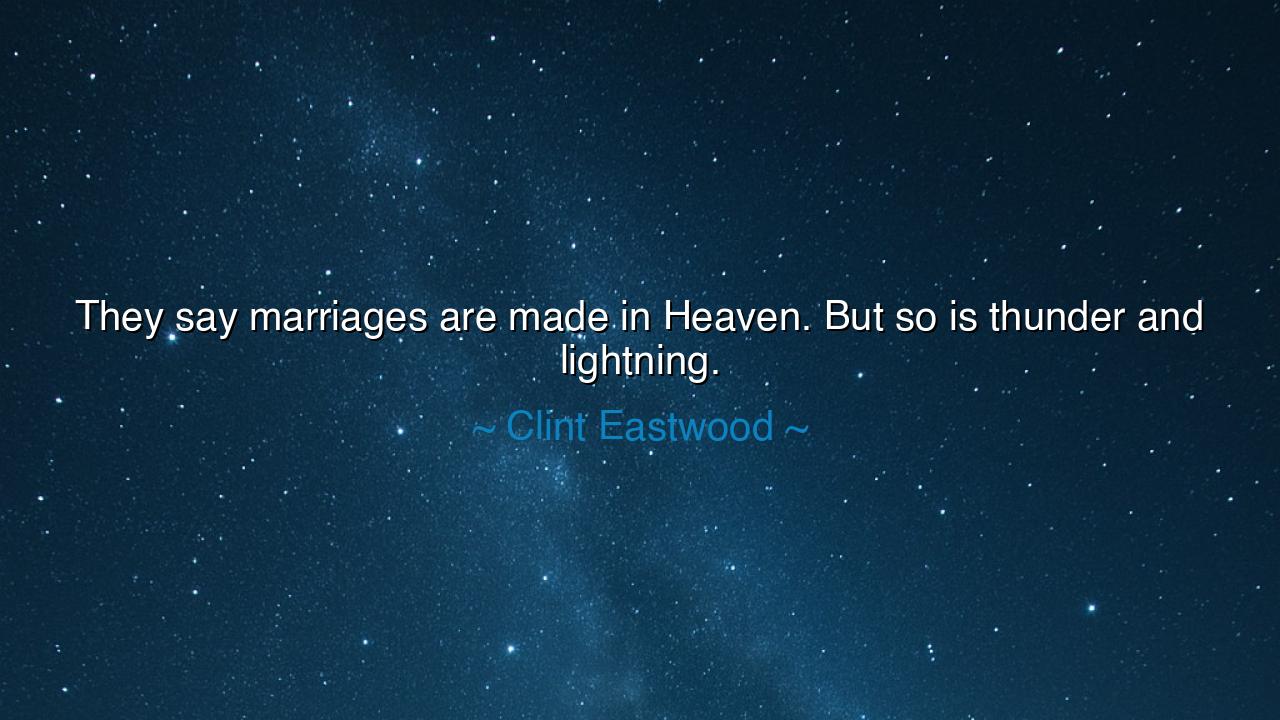
They say marriages are made in Heaven. But so is thunder and






“They say marriages are made in Heaven. But so is thunder and lightning.” Thus spoke Clint Eastwood, the laconic philosopher of the modern age — a man whose voice carries the grit of deserts and the wisdom of experience. In this simple yet profound jest, Eastwood unveils the dual nature of love and marriage — that it is at once divine and dangerous, radiant and fierce. His words remind us that what is made in Heaven does not promise ease, but rather depth; not endless calm, but storms that test the heart’s endurance. Heaven, after all, births both the rain that nourishes and the storms that shake the earth.
In the ancient days, poets spoke of love as both blessing and burden. The Greeks said Eros could lift mortals toward the divine or cast them into ruin. The Bible itself speaks of marriage as sacred, yet full of trials — a union forged not merely of joy, but of patience, sacrifice, and grace. Eastwood’s quip echoes these eternal truths. When he compares marriage to thunder and lightning, he strips away the sentimentality that often cloaks it and shows it for what it truly is: a force of nature. It can illuminate the sky with beauty, or strike with power that humbles all who stand too proudly beneath it.
Marriage, like the storm, is born of opposites — the meeting of two elements, each fierce in its own right. In the joining of those forces, there is both creation and conflict. The lightning represents passion, the spark that ignites love and gives it brilliance. The thunder represents the echoes that follow — the disagreements, the challenges, the inevitable aftermath of two souls learning to live as one. Yet both are necessary. Without lightning, there is no energy; without thunder, no reckoning. Eastwood’s humor conceals a timeless truth: that the beauty of marriage is not found in avoiding storms, but in weathering them together.
Consider the story of John and Abigail Adams, whose letters across oceans and wars have survived the centuries. Their marriage was not of ease, but of endurance. While John served abroad, Abigail managed their home, raised their children, and kept faith through years of absence. Their words to each other — sometimes tender, sometimes fiery — reveal both love and struggle. They argued fiercely on matters of politics and principle, yet they never lost respect or devotion. Like thunder and lightning, they clashed, they shone, and through that storm they forged a bond stronger than calm could ever bring.
Eastwood, a man known for his stoic strength, understood that relationships are not sustained by perfection, but by resilience. His wry observation captures the irony that even heavenly things demand human effort. People often believe that what is “made in Heaven” must be flawless — that love should be effortless and perpetual. But Heaven, as Eastwood reminds us, also sends storms. It is through those tempests that we learn humility, patience, and the art of forgiveness. True love is not the absence of thunder, but the courage to stand beside one another as it rolls across the sky.
Yet, the humor of Eastwood’s quote also warns against naïveté. For many, marriage begins in the lightning of passion but falters when thunder follows. He invites us to see love not as fantasy, but as discipline — an act of will, not just emotion. The heavenly origin of marriage does not mean it is untouched by trial; rather, it means that even its difficulties have purpose. The storm refines the soul as fire refines metal, and only those who endure its fury discover its peace.
So, O seeker of wisdom and companionship, take this lesson from Eastwood’s thunderous wit: do not fear the storm in love, nor curse it. When it comes, stand firm. Remember that thunder and lightning, though fierce, come from the same sky that gives sunlight and stars. Let the lightning remind you of passion, and the thunder of humility. Speak kindly even when your voice trembles. Forgive when the sky darkens. And when calm returns, cherish it as the rare and sacred silence that follows divine creation.
Thus, let Eastwood’s words echo through the ages: marriage is both heaven and storm. It is not a promise of peace, but a pilgrimage toward understanding. And those who brave its tempests together will find that, though lightning may strike and thunder may roar, the same heavens that send the storm also send the rainbow that follows — the quiet beauty of love renewed, stronger than before.






AAdministratorAdministrator
Welcome, honored guests. Please leave a comment, we will respond soon